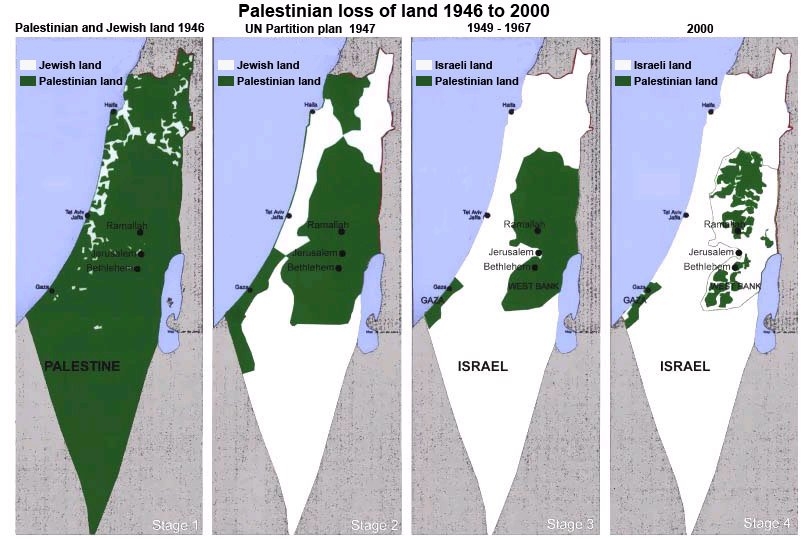On October 31st, Palestine was officially admitted as a member of UNESCO. This is one of the biggest and most important organizations of the UN, so this incident raises the possibility of Palestine being admitted into other organizations as well, and being realized as an independent nation in the near future. The US and Israel have been reluctant to have talks regarding Palestine being acknowledged as an independent nation, saying that peace negotiations should take place before any steps can be taken. However, Palestine didn’t simply sit back and wait for these talks to take place, and actively requested that they be admitted into UNESCO as a separate nation. At the UN General Assembly held in Paris France, Palestine received 107 votes out of a total of 173 countries. Though as many as 52 countries cast a blank ballot, Palestine managed to receive two-thirds of the remaining votes.
How did this conflict start in the first place?
On May 14th 1948, the Jews ended their 2000 years of wandering around, and settled down in Palestine because that is where Zion is located, the land that they claim their ancestors used to live in. By using a great deal of force, the Jews were able to drive out the Palestinians who were living in the area at the time. The main actors in this process were the Zionists. Zionism is a nationalist movement with the purpose of founding a Jewish country in the Palestine area. Due to this firm goal, Zionists tend to be extreme, and it is mainly because of these people that the Arab people of Palestine were suddenly driven out of their homeland. Of course the Jewish race has a history of being mistreated and abused, and it is estimable that they came together as one in search of their homeland. Even so, the method in which they established their own country can hardly be justified. Due to this historical background, it is natural for the relationship between Palestine and Israel to be immensely tense.

Why can’t this conflict be solved?
As mentioned above, the US and Israel have been requesting a peace negotiation before steps can be taken to acknowledge Palestine as an independent country. One of the main reasons that Palestine is refusing to sit down and negotiate, is because they know that Israel won’t back down when it comes to the Israeli settlement problem. An Israeli settlement refers to a Jewish civilian community built on land that was captured by Israel from Jordan, Egypt, and Syria. These settlements currently exist in East Jerusalem, the Golan Heights, and the West Bank near the Jordan River. These areas may be affected by Israeli law, but the international community is viewing these communities as mere settlements, or illegal occupations. These settlements have been and still continue to be a very serious problem between Palestine and Israel. In the past, peace talks, which were progressing at the time, were abruptly stopped due to Israel restarting the construction of the settlements. Even American President Barack Obama mentioned that the settlements are territory that Israel should hand back to Palestine. After the decision of admitting Palestine into UNESCO was officially made, Israel expressed their dissatisfaction by building even more settlements. This kind of behavior will only make it harder for Palestine and Israel to negotiate with each other, which is why some are saying that Palestine’s admittance into UNESCO will only bring additional conflict.
Why is the US so against it?
It is natural for the US to act sensitively to Palestine being admitted into UNESCO, since so many of their interests are interlinked with Israel. The first Jewish people that immigrated to the US were those who were deported from Catholic countries such as Spain and Portugal. They reached the US in 1654 and worked hard to be recognized as citizens, by participating in building barricades to block off Indians or taking part in the American Revolution. Between 1820 and 1870 more Jewish people went to the US and began entering into the mainstream economy by investing in railroads, mines, land, and even Wall Street. By 1910, roughly 2 million 8 hundred thousand Jews were living in the US. The Jewish people are still a minority in the US, but have very strong networks amongst one another and many of them are engaged in high-ranking posts. Some companies that are moved by Jewish people include Intel, Goldman Sachs, Lehman Brothers, MGM, CBS, Bloomberg, The Wall Street Journal, Starbucks, Calvin Klein and many more. This strong ‘power network’ of Jewish people rooted deep inside the US economy have made it possible for the US to keep a pro-Israel policy for so long.
Due to this background, the US along with Israel has announced that they will cut all funding for UNESCO. This decision is based on a legal requirement which states that the US will cut funds to any UN organization that acknowledges Palestine as a separate state. This law was passed in 1990 and shows how strong the pro-Israel inclination was in the US at the time.
Concerned about the sudden cuts in funding, the UN Secretary General Ban Ki-Moon gave out a rather negative statement regarding the admittance of Palestine, saying, “This decision is helpful neither to Palestine or anyone else.” On the other hand, a Palestine representative argued back that what should be changed is America’s law, and that it makes no sense that Palestine’s admittance will do any harm to the UN.
Meanwhile, the projects that UNESCO is working on are already being slowed down by the sudden cut in funding, so the decision of the US will not act positively upon their image. Some analysts say that this sort of action will only decrease the influence that the US has on the global community. Even now, the US doesn’t have much say in the conflict between Palestine and Israel and are being called ‘superpowerless’. If this sort of behavior continues the US will surely become isolated.

Korea’s stance on this issue
South Korea was one of the many countries who chose to cast a blank vote on this issue. In a situation where we are leading out a healthy relationship with both the US and the Middle East countries, voting in such a controversial issue put us in a difficult position. Our government officials stated that the decision to cast a blank vote was made in the national interest. They also stated that South Korea couldn’t support the decision to accept Palestine as a separate state since they did not yet go through a normal negotiation process. These statements are understandable to some extent, since the interests of a country cannot be ignored altogether. Even so, South Korea as well as other countries should have been able to push forward with their beliefs a little more in order to play their parts in the international stage. It is regrettable that South Korea was not able to do so this time.
Now that they are finally admitted into UNESCO, Palestine will definitely make efforts to get into other UN organizations as well. If they succeed in this task, the US will also have to stop funding for those UN organizations and they will slowly lose their place in the international community. Seeing that the American Jews have such great influence in US society, it will be hard for the US not to stand on Israel’s side. However, the majority of other countries seem to be trying to acknowledge Palestine as an independent country. This tendency can be seen in the 107 votes that Palestine received. The other 52 blank votes are seen to have occurred from countries that didn’t want any trouble with their diplomatic relationships. One point that shouldn’t be forgotten is that out of the five UN Permanent Council members, three countries, France, Russia and China, voted for Palestine to be admitted into UNESCO. The US obviously disagreed and England cast a blank vote. It seems that the time has come for the US and Israel to take a step back to negotiate with Palestine and put an end to this fruitless conflict.
Kim Kyu-hyun
moderato92@naver.com

